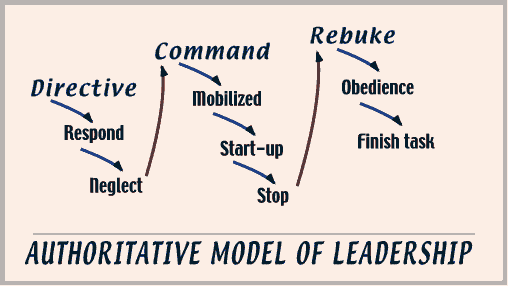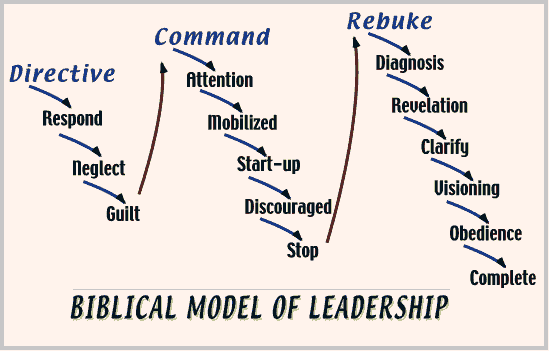
Discovering an Effective Leadership Model from the Book of Haggai
Paul J. Bucknell
What do you do when people don't carry out your instructions? Your answer shows some things about your leadership style. What you would like to do, though, really reveals how you will lead those you are responsible for!
God met up with the same problem that we often face. Incompetency. Laziness.
A) The Authoritarian Model of Leadership |
Neglect. By examining God's response to such a people in Haggai, we are able to clearly see a most effective leadership model that enables us to effectively lead at work, home or in the church.
Two ineffective models of leadership will also be discussed: authoritarian and libertarian, but our main focus will be explaining the effective biblical standard of leadership.
A) THE AUTHORITARIAN MODEL OF LEADERSHIP
Many employers, fathers and elders are convinced that the authoritarian model of leadership is the only way to get things effectively done. Unfortunately, they have missed out on real effective leadership as taught from the scriptures and gain their origin in the salvation plan of God.
There is nothing wrong with authority when properly used. An employer is responsible for the productivity of his employees. A father is responsible to have obedient children. Notice the common cycle that is often seen with those in authoritative leadership.

Command  Response
Response  Neglect
Neglect  (Repeat)
(Repeat)
And the cycle goes over and over. The one in charge must either accept inferior results or stay right in their vicinity. The above chart shows how one using the authoritarian model might work out in real life. Important issues involved in this model are listed below:
1) Effectiveness depends on the leader's presence and threat of power. (Hidden or spoken).
2) Relationships between the one in charge and subordinates are rough. (Repetitive rebuking).
3) Lots of extra guilt and sin. (On both sides).
4) The leader often despises rather than honors those under him.
5) The subordinates often complain and have a poor attitude toward the leader and what he represents.
6) No team spirit, joint ownership or pride of product.
Because of the effect of sin, this system breeds suspicion and in-fighting. They tend to develop into opposing sides, each insisting for their own rights. They are not a team but two opposing sides of a battle. We can see how this mentality lies behind the origin of work unions which only solidify the sides' suspicion and bitterness.
Again, there is nothing wrong for a leader to expect his people to work effectively. One would think that the vocalization of the order is enough, but this is not enough. Because of the inherent weaknesses of man and the evil one's diabolical obstacles, an order might not be obeyed. The spice of 'Sweet Rebellion' is in the porridge. This problem is exasperated when the leader despises the people and the subordinates are suspicious toward the leaders. Those in authority think the workers are lazy; the workers think things are unfair.
When the authority representative is present, the subordinates perform though sometimes rather stubbornly and slowly. When he is silent or absent, the once prioritized task becomes unimportant. They only fear getting caught and penalized rather than doing a poor job.
Notice this same pattern with the rebuilding of the temple in the Book of Haggai.
![]() #1 Rebuild the temple. (Ezra 3:10-13; Haggai 1:2 )
#1 Rebuild the temple. (Ezra 3:10-13; Haggai 1:2 )
Focus on their own homes. (Haggai 1:2,4)
The Israelites had begun rebuilding the temple 18 years prior to this ( 538 BC). They knew God wanted His temple rebuilt. Even the phrase "time has not yet come" reveals their acknowledged obligation to rebuild God's house. They ignored God's command and instead purposely occupied themselves elsewhere such as on their own homes.
![]() #2 Clear command to rebuild. (Haggai 1:8)
#2 Clear command to rebuild. (Haggai 1:8)
Mobilized to build (Haggai 1:12).
Slack off. Stop building. (Haggai 2:1-3)
The Lord's clear command in Haggai 1:8 puts the decision right before them. God doesn't act as a cheerleader here. He doesn't say, "I think you can do it guys!" God simply tells them to get the wood, build the temple and glorify God by their actions. His speech has great effect. Unified action brings about a powerful start-up momentum. Unfortunately, in less than a month's time they have again stopped working on the project!
![]() #3 Strong command to rebuild. (Haggai 2:4)
#3 Strong command to rebuild. (Haggai 2:4)
Continue building.
Haggai again approaches the leaders and reissues the command to rebuild in 2:4. By persistent oversight they finally get going on the building project again (2:18). It is interesting that the project is never said to be completed!
Those that favor this authoritarian model will tend to reinforce their judgment by the work that was accomplished when they were there. This is often enjoined by an attitude on how lazy the people are. They are oblivious to their own pride.
Some of us are tired of the ineffective and tense situations created by the authoritarian model. If we look closely at these two chapters in Haggai, we will see that God who has all authority actually uses another model for effective leadership.
The Book of Haggai, though, gives us a better perspective of leadership than the incompetency that was seen early on. Commands are still present in the biblical model. God had His agenda that needed to be accomplished. He clearly presents to the people what needs to be done and often how it is to be done. Commands and instructions are then found both in the authoritarian and biblical model of leadership. There is something different that happens that issues effectiveness.
What is missing from this above model that enabled the Israelites to eagerly finish rebuilding the temple? Let's take a look at the biblical model of effective leadership.
The above authoritarian model leaves out two key ingredients for effective leadership. Compare the chart above with the one below and see if you can spot what is different.

The authoritarian model tends to ignore the conditions in which people work most effectively. People are not robots that need to be started up. Parents often find themselves 'barking' louder and louder at their children to get things done right. The government uses more and more complex laws to guide the decisions of the citizens. The boss acts out of frustration over his workers and somehow believes his burst of anger will help motivate the employees to work harder.
The biblical model of leadership is found all throughout the scriptures because it is rooted in the way God chose to work with mankind. With the angels He seems to use this authoritative model. He commands, and they do His bidding. If they disobey, as some did, He instantly judges them. He works with those who obey His every command.
God chose to work with people in a different way. This choice, of course, is tied into the way He differently made them. God made man with a will. He would need not only command the people's bodies but influence their minds, hearts and wills. He bound Himself to work within their limitations to accomplish His great and mighty deeds. All through this process, we are reminded again and again that God is demonstrating the glory of His love and wrath. We should expect God to deal differently with mankind because He chose to. However, we should not demand that He act with grace. That is His prerogative.
As we look more closely at God's way of dealing with His people, we will be astounded by His kindness. That is, of course the point of the whole salvation plan! Once we are familiar with it, we will see it imprinted all over the pages of scriptures.
1) Biblical Leadership in Haggai
We are absolutely surprised
|
One of the distinctive aspects of biblical leadership is described in the Book of Haggai where God deals with the Israelite people at a time of their failure. Instead of treating them as enemies, God actually deals with them as important partners in His mission. This is all the more remarkable when we consider God's great power and authority in against the people's plain irresponsibility.
What is even more helpful in understanding this model is the way God deals with those who have gravely failed Him. By understanding how conflicts are dealt with we can get such a deeper insight into the values of those involved in the conflict. We are absolutely surprised as to how God peered into their hearts and worked with them on their level of understanding so that they could join Him in His work.
2) Pinpointing the Problem
The Lord knew what the problem was behind the incomplete project. He pinpointed the difficulty to their despondency about their work on God's temple. This 'new' temple would not have any of the glamor of the first. One can almost hear them saying, "What's the use?!" They might even hear people mocking them, "What a great God you have!" What could they say about the missing ark of the covenant?! Or what about the other original temple furniture, the ornate stones and the missing exquisite woodwork?!
"Who is left among you who saw this temple in its former glory?
And how do you see it now?
Does it not seem to you like nothing in comparison?"
(Haggai 2:3).
God could easily have created an army out of dust just to build the temple. He wasn't as concerned about the building as the people. He wanted the people to be part of its construction. He chose not to use an authoritative voice that would crush their spirits but an encouraging tone that brought hope to the Israelites. God wanted these sinful and irresponsible Israelites to be part of the rebuilding of the temple. He didn't want just hands building it but hearts. God was not just building a building but a hope. The point of constructing the temple was the people, not vice-a-versa. And so the LORD came and identified the reason for their lack of motivation that resulted in the incompletion of the temple.
Biblical leadership needs to pinpoint the problem why something isn't being done. There are numerous possible reasons why something isn't done. In their case they got discouraged. They had no understanding of building an inferior building. However, at times it is distraction, forgetfulness, busyness, rebellion, confusion or just inability.
3) Valuing the People
At the heart of this detection of the problem is a special view of those workers. For if we do not have the right perspective of the workers, then we will gloss over the problem and merely 'shout' or threaten them back to work. God as the construction manager saw His subordinates more as teammates than pawns to be simply moved about. He chose to value the people and so was interested in enabling them. We can say that God's mission centered on the people not the building. The work is the people. If the people's hearts aren't joined in the work, then the work has failed. Only with this prior commitment to the value of the people, will effective leadership develop.
Some people find this a bit repulsive because they insist on God's purpose is always to glorify Himself. Agreed, it can sound like man-centered doctrine as if it is God's chief purpose to serve man. This would be a misunderstanding. |
We have a difficult time understanding how the concept of team leadership originates with God. However, it did. In fact from this fact, we can say that great team leaders can have great authority and power. We should not think that this is a reason for denying such a person to be a team leader. More important is the inward calling or motivation to enable people to succeed at what is good and worthwhile.
This team concept is described for us throughout the pages of scripture. God was Adam's coach. God created His own nation Israel not to fight battles but to be close to Him. This is the reason He said they are not to have chariots. God's chief job was to prepare a people, a team that would work with Him.
Secularism is the opposite to this. Secularism is man getting it done on his own. This is exactly the opposite to what God wants. Unfortunately, the principles of secularism with its arrogant spirit is often what shapes what goes on in the workplace, home or even in the church. We see this concept most clearly in the New Testament teachings when Jesus is described as the head and His people form His body. We see it again strongly seen in the image of Christ the bridegroom and the church His bride. We see God esteeming His people when He says that we are no longer called slaves but friends.
"No longer do I call you slaves, for the slave does not know what his master is doing; but I have called you friends, for all things that I have heard from My Father I have made known to you. (John 15:15).
God sets the mission. He gives the orders. But just as important, if not more important, is to involve His people in the eagerness to do His work. This is His love extended. The people are important. They are so important that the CEO had His Son die so that the subordinates would succeed and do well.
Empowering man is not to glorify man
but to glorify God by showing
His amazing and awesome work in rebellious mankind.
We see this message affirmed in each chapter of Haggai. Two times we find men acting irresponsibly. If the job was up to them, it wasn't going to be done. God, however, doesn't come in charging as a Judge, though He could rightfully have done so. He instead gently steps in as a Shepherd and tends to the needs of the sheep.
Unfortunately it is rather common to find people not completing their job. In order to have effective team workmanship, we need to be technicians of the heart. This doesn't come easily. In fact, much confusion exists because of another model of leadership which we will call the libertarian model. We have talked about the authoritarian model. The libertarian model , however, stands at an opposite extreme emphasizing man's freedom and inherent goodness. Many people confuse this model with God's biblical model because of its emphasis on the people that the authoritarian model completely excludes.
The libertarian model has recently become popularized by the self-esteem movement. It assumes man knows the best thing to do and only needs the right environment. However, when we see it in operation, we are horrified by its results. Those in authority give up their wisdom and knowledge so that they can seek the idolized opinion of their subordinates. Such parents, for example, end up not daring to influence their child's supposed innocent (and perfect wlll) but insist on asking the child what they think is best. The child ends up manipulating the parent and other authoritative figures so to gain its own will. So although God has given responsibility to the parents, they become irresponsible to their God-given position as parents even when they think to more effectively train their children.
We are glad to see this model less often at the workplace, but it is not absent. The more the money supply is not a crucial factor, such as in government monopolies, we see inefficiency galore. The more senior one gets, the more lethargy they seem privileged to! Mission does not shape them. Desires and selfishness causes great waste and horrific results. God's way blends the best of the two ways with supernatural grace, love and wisdom.
We need to be trained by the Spirit to know how to identify the real problems people face under our leadership. Haggai only told the people what God told him to. He did not know their problem. In short we need God to help us know this by being spiritually-filled and prayerfully reading through the Gospels noticing how Jesus identified the real problems of His disciples. A discussion on this would indeed take us far beyond the focus of this article.
4) On Finding a Solution!
The first problem with the authoritarian method was the neglect to identify what the heart problem of the subordinates might be. This is what actually caused them to not obey or comply anymore. The second problem is dependent upon the first. We find that they ignore discovering the real solution to the problem. They might care less, but in God's leadership among His people, we find God brings in a solution that works.
Bypassing of the real problems causes extreme antagonism and even hatred at times. The authoritative model just plows ahead pushing the subordinate to do what he or she is suppose to. They see no place for feelings and are insensitive to the personal problems that they are facing. The work will go on as long as one carefully governs their action by close monitoring them. However, this 'effectiveness' is done at a great cost.
A father will face a rebellious teenager when his son realizes he can live on his own. The employee makes it as hard as possible for the employer or just leaves the boss in a lurch. The church body votes and goes along with the pastor, but he finds that people are dropping their responsibility. The authoritative leader usually responds in rage wondering where these people learned about responsibility when all along, he doesn't realize that he has not acted in love by ignoring a person's genuine needs.
A few months ago I was wonderfully surprised by a personal officer of a company that bent over backwards to help one of their employees. This particular worker's ten year old daughter had recently died. I asked the supervisor about their policies, and he mentioned that they prioritize the needs of their workers. The company actually budgeted monies to be used to care for the personal needs of this worker. They not only paid for the funeral buffet but activated the his colleagues to help him out. The funeral parlor was filled with concerned colleagues including numerous senior ranked leaders.
The Lord identified their problem in Haggai 2:3 and then went on and took gracious steps to help the people to get back on track.
- Clarify the command and bring encouraging words
We find that the Lord sought out those responsible and encouraged them to go on and finish the job. The Lord spoke separately to Zerubbabel the governor, to Joshua the priest and to the people. He didn't blast them with accusations of failure but built confidence in them by telling them to, "Take courage and work." We are encouraged when we hear the Lord speak so graciously. They definitely didn't deserve it. This is self-control in action. After encouraging them, He focuses them on what needs to be done. He did not lessen the task formerly assigned to them. He just pointed out what they needed to do.
"But now take courage, Zerubbabel," declares the LORD, "take courage also, Joshua son of Jehozadak, the high priest, and all you people of the land take courage," declares the LORD, "and work; for I am with you," says the LORD of hosts. (Haggai 2:4).
However, he also says, "I am with you." The Lord did not want them to think they were doing it alone. In fact, He began to reveal to them a most precious promise of His presence - not any different than in the Great Commission (Matthew 28:20). He will go on and amplify this meaning in the following verses, but for now we can say irresponsibility should not have us conclude that the job was too tough. Nor should we automatically just find out another way to do it. The Lord puts it back in clear perspective by repeating it. The rebuilding of the temple was God's will. God would be their strength. God wants to be close to them but desired that temple to be rebuilt.
- Visioning
We are astonished at the detailed response that the Lord gives the Israelites in Haggai 2. Usually, those in authority have only a few sharp words to the irresponsible. They can't perceive the real problem as the Lord did. The Lord knew that in this case failure came as a result of the loss of vision. He needed to rebuild their vision so that they would rebuild the temple. God gave them an elaborate explanation of His greater purpose for rebuilding the temple. Let's look at these three major points.
1) The building is not everything. (Haggai 2:5)
They are to remember the Tabernacle. Its glory was the Lord's presence not some building. His Spirit would be with them.
2) God's power is great; He promises. (Haggai 2:6-7)
They are to remember that as He spoke at Mt. Sinai, so He would speak again (Hebrews 12:26). The nations would serve this one nation. He will fill His house with glory.
3) The glory of the temple will be great. (Haggai 2:8-9)
The glory of the latter temple (the one they are rebuilding) will be greater than the former one by Solomon. God is helping them to see the grand purpose of what they were doing.
Application: So often, we get discouraged and give up because we do not know or remember the result of all our work. If adults are this way, imagine how much easier it is for children to forget the value of doing good. By going over the positive results, we encourage faithfulness.
ObedienceThey again got mobilized and laid the founding of the temple (2:18). Obedience is so crucial to right and happy living. We need to be trained to obedience. We cannot guarantee that we will have nice, considerate and gracious leaders over us who will coach us along. Parents need to train children to obey not to disobey. When God speaks, we do what He wants. Although God did not deal with the Israelites as they deserved, they still did disobey. This was God's point in Haggai 2:11-17. He first showed them how unclean they were and then proved it by mentioning all the troubles that came upon their land. Blessing came only when the temple was in the building stage again. (2:18-19). Application: People can talk obedience but the test is in what they do. We must not tolerate disobedience in our hearts or in our children. We need to be firm and clear with those who have turned aside. |
These bars represent the support we |
 How many supports can be taken away from you, and yet you still remain firm in your obedience? |
 Our goal is to live by faith rather than by sight. This practically means that our obedience is no longer dependent on those things around us but on what God has clearly said. |
- Completion
The rebuilding of the temple was completed, but this was mentioned in Ezra not here. There might be a theological reason emphasizing the ongoing building up the new temple (the body of Christ) or a practical one that Haggai wasn't there to see it finished.. The Lord, however, in 2:18 considered the project as well as done with the founding. Once people are properly trained, they become His team in getting the work done. The truths of God have enabled them to do what God has called them to. This is true freedom indeed.
God's means of gracious leadership is the model that we need to adapt as God's leaders. The Lord values the subordinates. They might be unworthy and irresponsible, but we can by God's grace figure out their problem of discouragement. We can come along and give them the encouragement they need. God reveals His greater plans with them and so incorporates them in His rebuilding plans.
The plan is no longer only God's; the vision is stored in their heart. They will not be so easily distracted. When they see the fading glory of this temple, they will realize that there is a greater glory. They will not focus on the physical but the spiritual. It is the presence of the Lord that makes the temple glorious. All those images of the Lord accompanying the Israelites out of Egypt in the tent of tabernacle will be able to be fulfilled in their own lives.
Effective biblical leadership lifts each player, worker, child up to be a team player when the overall vision is passed on. The vision must touch their personal needs to be effective. They need to see the relevance of the product, the right decision, the cost of obedience, the extra hours, etc. As they do, they will be energized and strengthened to do God's work.
Perhaps in summary, we can say that the key is seeing that the life and participant of the individuals involved are more important than the job itself. With this mindset, the leader find a way to get them enthusiastically involved. Those problems that hinder their growth, must be examined and solved just as any technical problem might threaten a product. We need to remember, in against the liberty model, that the commands are firm. There are leaders who are responsible to pass direction down and to get projects done. We must not forget this command framework for enabling a strong team.
Let's review these three models before making some applications to the family, church and work scenes.
Application to the family
There are a lot of grumpy pa bears out there. They often don't act until they are provoked and then they roar with an ugly fierceness. We need to exchange this model for the biblical model of leadership where our goals are focused on the healthy development of our children. We see this pattern in Deuteronomy 6. The father here is regularly teaching the child not only the what but the why. These goals will take our time. We will need to adjust our time accordingly. That is fine and expected. Without developing the soul of the child, they will not have the spiritual principles in them to guide them.
The father needs to not only have a family vision but to pass it on to his wife and children. They need to know why the Jones's family or the Lee's family exist. Our family's vision is to glorify God through godly living so that Christ's glory and love might be made known to those around us and throughout the world. There will be many things to frustrate our purposes, but we can surely seek the Lord's wisdom to help us foster the needed values in our children to accomplish our God-given goals. Without any vision, we will not shape our children according to God's purpose. They will be world-influenced children rather than God-influenced children.
Vision > Values
Application to the church
Too few workers doing too many things? This is often the way the church is. In these situations we are often willing to allow the administration of the church to act as a dictator of our actions. Christ refused to do this. He slowed down enough to listen to the frustrations of His disciples and make a few comments that helped keep them on track.
When workers are being burned out, then we know we are not paying close enough attention to their personal needs and lives. Yes, it is true that many of them have stopped meeting with the Lord, but we should still be on top of this and help guide them before they get to a point they just give up and think the Lord has no use for them. People are more important than church calendar. If God wants to do it, then He will provide the hands and hearts to do it!
Application to the work place
God's love will be passed on when we begin caring for the people more than the product. We are not suggesting to sacrifice the product; in that case there will be no work to serve the people. The company must think about their major goals as serving the people through development of the product rather than producing the marketable product and ignoring the people's needs. Great steps have been taken place in the corporate world in these last years, but God's power of love is needed to rightly accomplish the goals.
1) Do people enjoy working with you?
2) When evaluating a finished project, are your relationships closer with each other or more strained?
3) Do the people want more time together with the leader or less?
4) Are your goals clear? How have you passed your vision on? Are you passing it on one by one?
God's Purpose for Mankind
God is graciously and kindly working with our irresponsible race in such a way as to bring many to join His team, work for Him, and share His wonderful profits with them forever. He does this to manifest His great and glorious grace to all.
 Our BFF Old Testament Digital Library includes many more Bible studies along with books, powerpoint slides and hundreds of articles making the scriptures come alive.
Our BFF Old Testament Digital Library includes many more Bible studies along with books, powerpoint slides and hundreds of articles making the scriptures come alive.
 Our BFF New Testament Library includes many more Bible studies including several books like Romans, Ephesians, 1 Peter, 2 Peter study booklets.
Our BFF New Testament Library includes many more Bible studies including several books like Romans, Ephesians, 1 Peter, 2 Peter study booklets.
Do check out our huge stash of Old and New Testament biblical resources, including many rich bible studies. They can be downloaded or purchased on Libraries. All our biblical books, studies, videos, audios, powerpoints, handouts, articles are on them. Click->Take a look!
info@foundationsforfreedom.net
Scriptures typically quoted from the New American Standard Bible unless noted:
(C) Copyright The Lockman Foundation 1988












 The authoritarian model has a leader running the show by himself. He might use people to get his job done, but they are of no great importance to him. By doing it alone, he boasts in his own accomplishments, "I did it." Not many share his satisfaction with him. In fact, the job was done at a great cost of wasted time, extra financial costs, tense relationships, and unfulfilled expectations.
The authoritarian model has a leader running the show by himself. He might use people to get his job done, but they are of no great importance to him. By doing it alone, he boasts in his own accomplishments, "I did it." Not many share his satisfaction with him. In fact, the job was done at a great cost of wasted time, extra financial costs, tense relationships, and unfulfilled expectations. The libertarian model is convinced of the value of the individual but unfortunately divorces themselves from hierarchal authority. Everyone wants to go their own way and God's will is not accomplished. People feel cheated rather than fulfilled. No job is done.
The libertarian model is convinced of the value of the individual but unfortunately divorces themselves from hierarchal authority. Everyone wants to go their own way and God's will is not accomplished. People feel cheated rather than fulfilled. No job is done. The biblical leadership model incorporates a strong vision building purpose that defines their purpose but also guides him in closely working with his partners in completing the job. They are teammates rather than enemies. They are on the same team accomplishing the task God has put before them.
The biblical leadership model incorporates a strong vision building purpose that defines their purpose but also guides him in closely working with his partners in completing the job. They are teammates rather than enemies. They are on the same team accomplishing the task God has put before them.